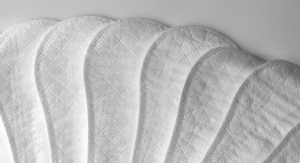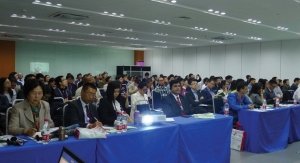Svetlana Uduslivaia03.09.17
While India remains one of the key growth markets for the disposable hygiene industry, the road to success in the market is far from smooth. Widespread poverty, cultural perceptions, the status of women and lack of access to affordable products outside of urban areas are among the factors that continue to impact the use of disposable hygiene products, including sanitary protection.
In response to a dire need for affordable products, a growing number of start-ups in India have been making it their business to provide solutions to low-cost disposable hygiene products. Jayaashree Industries - a pioneer in manufacturing low-cost sanitary protection solutions in India - reports that, to date, it has installed 1300 machines producing sanitary protection towels across 27 states in India and seven other countries. A single machine’s minimum capacity is 1600 towels per day. This represents close to 760 million towels annually in total production at only minimum capacity.
A number of NGOs working in India have been building further on the Jayaashree Industries concept. U.K.-based Binti is one such NGO. Founded by Manjit K. Gill, Binti is working on projects that help to fund and set up micro-factories, run by local women, to manufacture and sell low-cost sanitary protection towels in India’s rural areas. The organization is also assessing the feasibility of establishing similar projects in Africa, where the need for affordable sanitary protection is just as dire.
Euromonitor’s Svetlana Uduslivaia spoke with Joshna Raghwani, who has been working with Binti as a director of corporate social strategy, and discussed the situation with regard to sanitary protection products in India and Binti’s work.
Svetlana Uduslivaia (SU): Could you give us some background into Binti and its origins?
Joshna Raghwani (JR): Binti was started in 2014 by Manjit K .Gill. It is a U.K.-based social enterprise aiming for a wide outreach to women in developing countries, to provide affordable sanitary protection products, to educate, to improve the position of women, and to overcome taboos around periods.
Geographically speaking, Binti’s current focus is India. The founder, Manjit, has Indian roots and is very familiar with social taboos and cultural inhibitors. She has a good understanding of local culture. We are also looking into the feasibility of establishing similar projects in Africa, for example Kenya.
Education about periods and getting rid of the shame associated with feminine hygiene is important, even in developed countries like the U.K. However, the lack of access to hygiene products is also a significant problem in India.
SU: How dire is the situation with regard to access to affordable sanitary protection products in India? Is the need more urgent in rural areas and small towns?
JR: India is a very diverse place, and access to products is also shaped by cultural practices in each city and region. In rural India, cultural inhibitors are strong. When Binti set up its first project in Gurgaon, not far from Delhi, we were faced with strong local attitudes about feminine hygiene and use of sanitary protection. However, the younger generation is typically more open to using sanitary protection.
Access is also dictated by availability and affordability. In India, most sanitary protection products are still sold through chemists. In rural areas, however, a chemist is different from a chemist found in an urban mall. In rural areas, chemists are more like a general grocery store and many do not carry sanitary protection products. Women have to travel to a bigger city to buy them. Although the situation has been improving, product availability is still a problem. These additional costs of travel also play a role in how accessible the products are to women.
Furthermore, even when products are available in local stores, there are usually very few choices, often limited to the Whisper and Stayfree brands. They might not be terribly expensive, but they are still seen as luxury items. For the most part, in India men are still purchasing sanitary products for women and are not always willing to pay extra.
SU: When did the first machines become available and how fast has the demand grown since?
JR: The idea was spearheaded by Arunachalam Muruganantham, the founder of Jayaashree Industries. He began manufacturing the machines about 10 years ago, and these are now available in 27 states in India. The idea is to make them as efficient and as low cost as possible.
SU: Who are the typical women involved in working on the machines/producing the products and principal users of final products?
JR: A typical woman working on the machine is a housewife. Some women also work on farms. The age range of women operating the machines is quite wide: from women in their mid-20s, just married, sometimes with the first child, to older women. It is a way for many women to earn an income. However, to operate the machines, women still often need to ask for their husband’s permission. Usually women prefer that the machines are installed close to their homes. The projects are often being promoted by word of mouth within the communities women live in, helping to build a wider outreach.
Typical end users of the products are young girls. Some have just started their period. They attend a school or a college.
SU: Are the raw materials provided by local suppliers?
JR: Raw materials are primarily locally sourced, and wood pulp is a main component. Binti, however, is in talks with other companies and is assessing the possibility of alternative supplies and ingredients, such as hemp for instance.
SU: How are the final products promoted and distributed? Do the final products come at a cost to women or are they distributed for free, or a combination of both? How much do they cost compared to branded products in stores?
JR: We want local women to run the projects and become more financially independent. So, these projects need to make money, and the products are sold at a cost. However, they are priced lower than leading mainstream brands. The retail price averages about Rs18 to Rs25 for a package of 12 towels. Brands like Whisper retail for about Rs30 and more for the same quantity.
Binti is working to set up a more structured distribution and is working with local chemists. The price, of course, has to be right for the local stores to agree to carry the products.
Binti is also assessing the possibilities of establishing distribution through local schools and colleges using, for instance, vending machines. We are also looking at distribution to hospitals as well as seeking to engage various organizations to purchase products in bulk and then donate them.
SU: Aside from making more affordable products, what other benefits are there to having such machines in place? Increase in female employment, improved incomes, others?
JR: We can definitely see a positive social impact of the projects. Women are becoming more financially independent. Education is also an important aspect of the projects, and this does not only concern girls. Boys and men are becoming more educated about respect for women. There is also a health aspect to it as the projects address the issue of safe hygiene practices, create awareness of menstruation and reproductive systems, and help to address the problem of missed school days due to periods.
SU: What are the main obstacles/challenges to this type of initiative in India?
JR: The challenges vary from bureaucracy to logistics to cultural attitudes. The machines run on electricity, and supply of electricity can be short, lasting 3-4 hours a day and during only certain times of the day. Buying a generator adds to costs. There is also bureaucracy and red tape to overcome while setting up the machines or organizing payments. Delivering machines to a specific area can be a problem, with the machines sent to the wrong destinations. There are also cultural aspects with respect to the use of land as well as the fact that many women still need to ask for a man’s permission to take part in the project.
SU: How do you see the future of these machines? More demand? More challenges or fewer challenges going forward?
JR: We are seeing a lot of innovation around the machines. They are becoming more efficient, thereby reducing the costs of products further. We are seeing innovation with respect to raw materials used. Additionally, other initiatives are starting to evolve around the micro-factories, such as installing burners next to the machines to address the issue of waste disposal. There are also “green” initiatives, which look into making reusable products. There are currently eight to 10 manufacturers of the machines. If the distribution continues to rise, then the manufacturers will need to scale up the production to meet the demand.
For more information, please contact Svetlana Uduslivaia: svetlana.uduslivaia@euromonitor.com
In response to a dire need for affordable products, a growing number of start-ups in India have been making it their business to provide solutions to low-cost disposable hygiene products. Jayaashree Industries - a pioneer in manufacturing low-cost sanitary protection solutions in India - reports that, to date, it has installed 1300 machines producing sanitary protection towels across 27 states in India and seven other countries. A single machine’s minimum capacity is 1600 towels per day. This represents close to 760 million towels annually in total production at only minimum capacity.
A number of NGOs working in India have been building further on the Jayaashree Industries concept. U.K.-based Binti is one such NGO. Founded by Manjit K. Gill, Binti is working on projects that help to fund and set up micro-factories, run by local women, to manufacture and sell low-cost sanitary protection towels in India’s rural areas. The organization is also assessing the feasibility of establishing similar projects in Africa, where the need for affordable sanitary protection is just as dire.
Euromonitor’s Svetlana Uduslivaia spoke with Joshna Raghwani, who has been working with Binti as a director of corporate social strategy, and discussed the situation with regard to sanitary protection products in India and Binti’s work.
Svetlana Uduslivaia (SU): Could you give us some background into Binti and its origins?
Joshna Raghwani (JR): Binti was started in 2014 by Manjit K .Gill. It is a U.K.-based social enterprise aiming for a wide outreach to women in developing countries, to provide affordable sanitary protection products, to educate, to improve the position of women, and to overcome taboos around periods.
Geographically speaking, Binti’s current focus is India. The founder, Manjit, has Indian roots and is very familiar with social taboos and cultural inhibitors. She has a good understanding of local culture. We are also looking into the feasibility of establishing similar projects in Africa, for example Kenya.
Education about periods and getting rid of the shame associated with feminine hygiene is important, even in developed countries like the U.K. However, the lack of access to hygiene products is also a significant problem in India.
SU: How dire is the situation with regard to access to affordable sanitary protection products in India? Is the need more urgent in rural areas and small towns?
JR: India is a very diverse place, and access to products is also shaped by cultural practices in each city and region. In rural India, cultural inhibitors are strong. When Binti set up its first project in Gurgaon, not far from Delhi, we were faced with strong local attitudes about feminine hygiene and use of sanitary protection. However, the younger generation is typically more open to using sanitary protection.
Access is also dictated by availability and affordability. In India, most sanitary protection products are still sold through chemists. In rural areas, however, a chemist is different from a chemist found in an urban mall. In rural areas, chemists are more like a general grocery store and many do not carry sanitary protection products. Women have to travel to a bigger city to buy them. Although the situation has been improving, product availability is still a problem. These additional costs of travel also play a role in how accessible the products are to women.
Furthermore, even when products are available in local stores, there are usually very few choices, often limited to the Whisper and Stayfree brands. They might not be terribly expensive, but they are still seen as luxury items. For the most part, in India men are still purchasing sanitary products for women and are not always willing to pay extra.
SU: When did the first machines become available and how fast has the demand grown since?
JR: The idea was spearheaded by Arunachalam Muruganantham, the founder of Jayaashree Industries. He began manufacturing the machines about 10 years ago, and these are now available in 27 states in India. The idea is to make them as efficient and as low cost as possible.
SU: Who are the typical women involved in working on the machines/producing the products and principal users of final products?
JR: A typical woman working on the machine is a housewife. Some women also work on farms. The age range of women operating the machines is quite wide: from women in their mid-20s, just married, sometimes with the first child, to older women. It is a way for many women to earn an income. However, to operate the machines, women still often need to ask for their husband’s permission. Usually women prefer that the machines are installed close to their homes. The projects are often being promoted by word of mouth within the communities women live in, helping to build a wider outreach.
Typical end users of the products are young girls. Some have just started their period. They attend a school or a college.
SU: Are the raw materials provided by local suppliers?
JR: Raw materials are primarily locally sourced, and wood pulp is a main component. Binti, however, is in talks with other companies and is assessing the possibility of alternative supplies and ingredients, such as hemp for instance.
SU: How are the final products promoted and distributed? Do the final products come at a cost to women or are they distributed for free, or a combination of both? How much do they cost compared to branded products in stores?
JR: We want local women to run the projects and become more financially independent. So, these projects need to make money, and the products are sold at a cost. However, they are priced lower than leading mainstream brands. The retail price averages about Rs18 to Rs25 for a package of 12 towels. Brands like Whisper retail for about Rs30 and more for the same quantity.
Binti is working to set up a more structured distribution and is working with local chemists. The price, of course, has to be right for the local stores to agree to carry the products.
Binti is also assessing the possibilities of establishing distribution through local schools and colleges using, for instance, vending machines. We are also looking at distribution to hospitals as well as seeking to engage various organizations to purchase products in bulk and then donate them.
SU: Aside from making more affordable products, what other benefits are there to having such machines in place? Increase in female employment, improved incomes, others?
JR: We can definitely see a positive social impact of the projects. Women are becoming more financially independent. Education is also an important aspect of the projects, and this does not only concern girls. Boys and men are becoming more educated about respect for women. There is also a health aspect to it as the projects address the issue of safe hygiene practices, create awareness of menstruation and reproductive systems, and help to address the problem of missed school days due to periods.
SU: What are the main obstacles/challenges to this type of initiative in India?
JR: The challenges vary from bureaucracy to logistics to cultural attitudes. The machines run on electricity, and supply of electricity can be short, lasting 3-4 hours a day and during only certain times of the day. Buying a generator adds to costs. There is also bureaucracy and red tape to overcome while setting up the machines or organizing payments. Delivering machines to a specific area can be a problem, with the machines sent to the wrong destinations. There are also cultural aspects with respect to the use of land as well as the fact that many women still need to ask for a man’s permission to take part in the project.
SU: How do you see the future of these machines? More demand? More challenges or fewer challenges going forward?
JR: We are seeing a lot of innovation around the machines. They are becoming more efficient, thereby reducing the costs of products further. We are seeing innovation with respect to raw materials used. Additionally, other initiatives are starting to evolve around the micro-factories, such as installing burners next to the machines to address the issue of waste disposal. There are also “green” initiatives, which look into making reusable products. There are currently eight to 10 manufacturers of the machines. If the distribution continues to rise, then the manufacturers will need to scale up the production to meet the demand.
For more information, please contact Svetlana Uduslivaia: svetlana.uduslivaia@euromonitor.com











